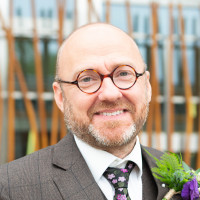Moving classroom support & local democracy up the agenda

Tories say they are the “strong opposition”, Labour just want to oppose. Scottish Greens are in Holyrood to do a different sort of job – have bold ideas and get stuff done.
This week was our once-a-year opportunity to choose the topics up for debate. Every child has a right to education. But teachers, parents and young people have been giving us blunt warnings.
A fifth of children in Scotland have additional needs because of issues such as autism, dyslexia, poor mental health, because they are deaf, blind or because English is not their native language. They need support to access education. Sometimes it’s just for a period or two a week or during exam time, sometimes much more.
Demand for support has gone up, but at the same time teachers and support staff dedicated to meeting these additional support needs have been cut – teachers down 13 per cent and support staff down eight per cent since 2010. Everybody is feeling the pressure.
The Scottish Government has passed on a financial squeeze to local authorities that is greater than the cuts it faces from the UK. Local authorities have managed to keep spending up on additional support, but falling staff numbers is piling on the stress.
Our debate was designed to move classroom support for young people up the agenda.
We need an education delivery plan that recognises the pressure staff face – John Swinney’s current plan published in the summer mentions ASN once in passing as a thing to “consider”. And we need a Scottish budget that raises more money from people on a higher wage like me so that local councils have the cash to spend on meeting children’s needs.
Scottish Greens’ income tax plans continue to be the boldest and most creative by far. They would mean everybody earning below the median wage would pay less in tax; and everyone earning more than average would pay more. Over all these income tax changes would raise more than £300 million in extra funds for public services.
The local elections are in May next year – most people won’t be thinking about them yet, but political parties are. Public sector cuts will be high up the agenda.
Andy Wightman led our second debate on local democracy. Andy is respected as a land reform and local democracy campaigner by people across the political spectrum. So the attempt to paint Scottish Greens as “real threat to local democracy in Scotland” by Tory MSP Alexander Stewart was met with not a little laughter.
Alison Johnstone quoted a recent poll from campaigners Our Democracy – Act As If We Own The Place. Apparently a quarter of people would finish the ironing rather than vote in local council elections. That might be depressing if our democracy was just turning out to vote once a year, but 45 per cent of the same people said they’d happily volunteer half a day a month to improve their local community.
John Finnie, as Green MSP for the Highlands and Islands, had something to say about local democracy in the region he represents. Highland Council covers an area the size of Belgium. He said a councillor on the planning committee will travel from Wick to Ardnamurchan to adjudicate on a planning decision – a distance of 230 miles, equivalent to someone in Portree or – to put it another way – someone in Doncaster in South Yorkshire deciding on planning matters in Edinburgh.
The minister took the opportunity to announce plans for new legislation on local powers – we look forward to the details.
This article first appeared in the National
